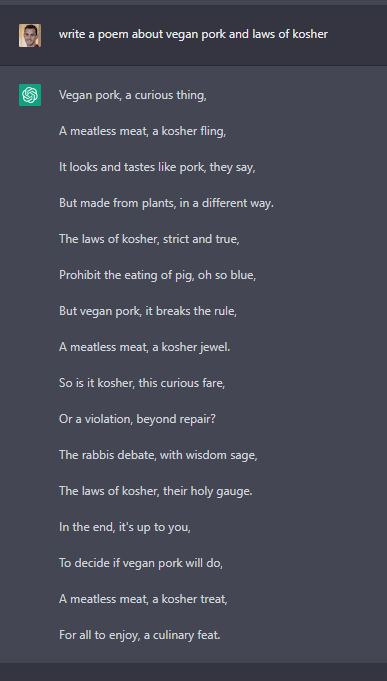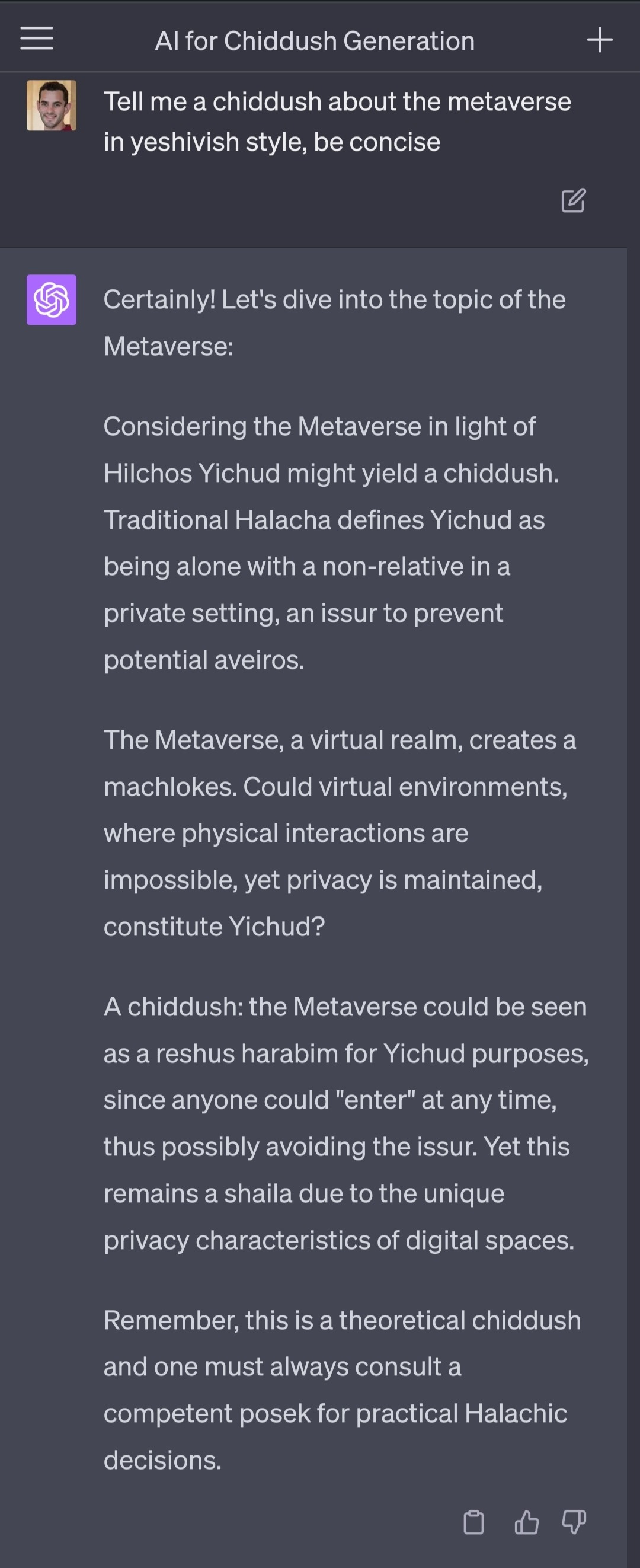Adventures in ChatGPT-4 and Pesak: A Confluence of Technology and Tradition
Exploring the brave new world of artificial intelligence and pesak halacha
This blog post dives into an ongoing dialogue with ChatGPT-4, asking questions related to Jewish law, or shailos. This dialogue is a fascinating exploration into an intersection between AI and halakhic decision-making, blurring the lines between Orthodox Jewish tradition and modern technology.
The main part of the blogpost is based on a series of recent Facebook posts that I posted in the last few months, after the appearance of ChatGPT.1
Before moving on to the actual prompts and answers, let me first quote at length from Professors Moshe Koppel and Avi Shmidman of Bar-Ilan University, in a 2020 article for the Orthodox Jewish website The Lehrhaus.[1] They write: “No such system appears imminent”, but this turned out to not be true. Merely three years later, we are at this point.
After discussing a wide variety of digital humanities projects related to Jewish Studies, and speculating on the future of them, they write:
As long as we are speculating on such matters, let’s do a thought experiment. Grandiose AI projects like IBM’s Watson, which defeated the best human Jeopardy champions, garner headlines and evoke fanciful dreams of a similar automated system (posAIk?) that might answer halakhic questions with greater alacrity than any rabbi. No such system appears imminent, but let us entertain the possibility that one day in the not-so-distant future, text analysis algorithms become sufficiently accurate to respond plausibly to halakhic questions, even to the extent of offering what an expert might regard as competent and reliable halakhic decisions. What would be the social consequences of this?
First of all, this would put accurate pesak at everyone’s fingertips. That’s great. Real poskim might even find such a tool helpful for formulating a decision. Wonderful.
But, such a tool could very well turn out to be corrosive, and for a number of reasons. First, programs must define raw inputs upfront, and these inputs must be limited to those that are somehow measurable. The difficult-to-measure human elements that a competent posek would take into account would likely be ignored by such programs. Second, the study of Halakhah might be reduced from an engaging and immersive experience to a mechanical process with little grip on the soul. Third, just as habitual use of navigation tools like Waze diminish our navigating skills, habitual use of digital tools for pesak is likely to dry up our halakhic intuitions. In fact, framing Halakhah as nothing but a programmable function that maps situations to outputs like do/don’t is likely to reduce it in our minds from an exalted heritage to one arbitrary function among many theoretically possible ones.
In short, Halakhah is preserved and developed as a human process that synthesizes book knowledge and moral intuition in subtle ways. Technical aids to this process will contribute significantly to accuracy, efficiency, and accessibility. At the same time, we must be cognizant that such tools could ultimately dim or even replace intuition, possibly resulting in alienation. We are probably still far from the point at which the long-term costs of technological aids to Torah study outweigh the manifest immediate benefits, but it behooves us to take into account that we may very quickly build up enough inertia to drive us well past that point in the future.
After this intro, let’s jump right into this brave new world of AI and halacha. sections are in chronlogical order, starting from December 2022, with the final one from yesterday—May 2023.
Is vegan pork kosher? A poem
Yichud in the Metaverse
Forcing to do mitzvot
RoboRov ChatGPT-4 is an interesting mix of yeshivish and progressive:
Asked ChatGPT-4 for some interesting sheilos I could ask
I asked:
[1] Moshe Koppel & Avi Shmidman, “Torah Study and the Digital Revolution: A Glimpse of the Future”, The Lehrhaus (January 28, 2020).






